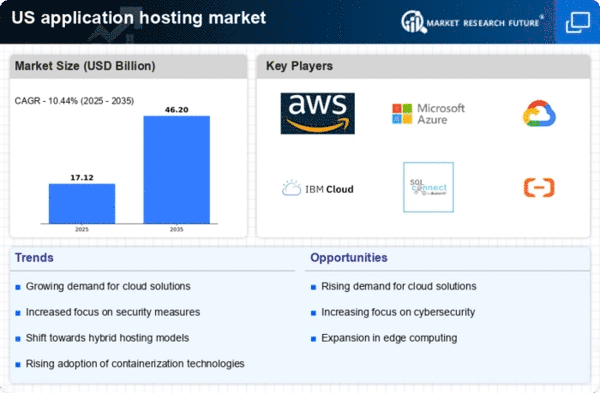Rising Focus on Cost Efficiency
Cost efficiency remains a critical driver in the application hosting market. Organizations are increasingly scrutinizing their IT expenditures, seeking hosting solutions that provide optimal performance without excessive costs. Recent statistics indicate that nearly 60% of US companies are shifting towards more cost-effective hosting options, such as shared and cloud hosting services. This trend is particularly pronounced among small to medium-sized enterprises (SMEs) that require reliable services without the burden of high operational costs. The application hosting market is responding to this demand by offering competitive pricing models and value-added services. As businesses continue to prioritize budget-friendly solutions, the market is expected to evolve, with providers enhancing their offerings to attract cost-conscious clients. This focus on cost efficiency is likely to drive innovation and competition within the application hosting market.
Emergence of Hybrid Hosting Solutions
The application hosting market is increasingly characterized by the emergence of hybrid hosting solutions. These solutions combine the benefits of both on-premises and cloud hosting, allowing organizations to optimize their IT environments. As businesses seek to leverage the advantages of both models, hybrid hosting is gaining traction, particularly among enterprises with complex IT needs. Recent surveys indicate that around 50% of US organizations are considering hybrid solutions to enhance their operational flexibility. This trend is reshaping the application hosting market, as providers are compelled to develop and offer integrated solutions that cater to diverse client requirements. The potential for hybrid hosting to deliver improved performance and cost savings is likely to drive its adoption further, positioning it as a key player in the future landscape of the application hosting market.
Growing Demand for Scalable Solutions
The application hosting market is experiencing a notable surge in demand for scalable solutions. Businesses are increasingly seeking hosting services that can easily adapt to their fluctuating needs. This trend is driven by the necessity for organizations to remain agile in a competitive landscape. According to recent data, approximately 70% of enterprises in the US are prioritizing scalability in their IT infrastructure. This shift indicates a clear preference for hosting providers that offer flexible resource allocation, enabling companies to efficiently manage their workloads. As a result, the application hosting market is projected to grow significantly, with an estimated annual growth rate of around 15% over the next five years.. This growing demand for scalable solutions is reshaping the application hosting market, compelling providers to innovate and enhance their service offerings.
Increased Regulatory Compliance Requirements
The application hosting market is significantly influenced by the increasing regulatory compliance requirements faced by businesses. With the rise of data protection laws, such as the California Consumer Privacy Act (CCPA), organizations are compelled to ensure that their hosting solutions comply with stringent regulations. This has led to a heightened demand for hosting providers that can demonstrate compliance with industry standards. Approximately 75% of US companies report that regulatory compliance is a top priority when selecting a hosting provider. Consequently, the application hosting market is witnessing a shift towards services that offer robust compliance features, including data encryption and secure access controls. This trend not only enhances the security posture of organizations but also positions compliant hosting providers as preferred partners in the market. As regulatory landscapes continue to evolve, the application hosting market is likely to adapt accordingly.
Advancements in Technology and Infrastructure
Technological advancements are playing a pivotal role in shaping the application hosting market. Innovations in infrastructure, such as the deployment of faster networks and enhanced server capabilities, are enabling hosting providers to deliver superior services. The integration of cutting-edge technologies, including edge computing and containerization, is further enhancing the performance and reliability of hosting solutions. Recent data suggests that approximately 80% of US hosting providers are investing in technology upgrades to meet the evolving demands of their clients. This focus on technological advancement is likely to drive competition within the application hosting market, as providers strive to differentiate themselves through superior service offerings. As infrastructure continues to evolve, the application hosting market is expected to witness significant growth, driven by the demand for high-performance hosting solutions.

















